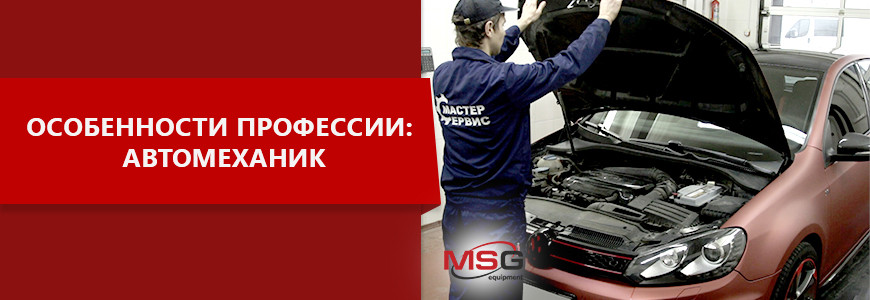Occupational characteristics: car mechanic

Autoservice performs a whole range of maintenance activities. The car repair industry involves a huge number of people from different professions. One of the main ones is the mechanic.
Work mechanic in the car service implies a multifaceted professional activity. There are several areas of this profession:
- specialist in chassis repair;
- specialist in engine repair;
- transmission repair specialist;
- mechanic-diagnostician;
The mechanic's duties include: support, repair and maintenance of all types of technical equipment; modernisation, maintenance, repair and replacement of systems, assemblies and parts; determining the causes of faults.
What a mechanic does
Chassis repair mechanic
A chassis mechanic deals with diagnostic measures and repair work on the suspension (chassis).
Suspension is always under increased stress and is therefore particularly susceptible to wear and tear. It should be diagnosed at least once every 10-15,000 kilometres, and urgently when the first signs of breakdown are detected.
Suspension is always under increased stress and is therefore particularly susceptible to wear and tear.
The chassis is a critical system where damage to one part can lead to failure of all components.
A chassis mechanic must:
A mechanic must
- know the device of the car;
- check the brake system of steering;
- be able to organise and carry out maintenance and repair of the car, its running gear and control mechanisms;
- have the skills to work with special equipment, instruments and tools;
- be responsible and attentive.
Mechanic for engine repair
Engine work – the most complex of all car repair services. Like other car systems, the engine needs to be serviced every 7-10 thousand kilometres. Mandatory maintenance includes oil changes.
Timely maintenance and diagnostics of the engine, can significantly extend its work.
If there are failures in the engine, the button «Check Engine» lights up on the dashboard, this is a signal that requires an immediate response. Uneven engine operation, popping, noises – also indicate an engine or fuel system fault.
An engine malfunction.
A motor mechanic's duties include changing oil, performing routine maintenance, replacing plugs, wires, gaskets and engine filters. Diagnosing and preventing malfunctions of everything related to the engine.
Main duties include oil changes, routine maintenance, replacing plugs, wires, gaskets and engine filters.
The engine repair mechanic must be in good physical shape, have basic theoretical knowledge and practical skills in the repair and operation of internal combustion engines. Know the types of repair, diagnostic equipment and be able to use them. To know the methods of installation and repair of equipment, to know the technical characteristics, design features of repair work of the motor. Be able to work with specialised diagnostic instruments. A big plus in this field – the presence of profile higher education.
Transmission Repair Technician
The transmission repair technician deals with the repair and diagnosis of transmissions.
The duties of a transmission mechanic include:
- Checking the clutch for wear and tear, its replacement, repair
- Checking the technical condition of driving axles, cardan shaft and transmission;
- Maintenance, repair of all transmission units.
Timely maintenance at the transmission of the car is recommended to plan after every 25 thousand kilometres of mileage. If maintenance is performed on time, there is a chance to find small malfunctions, which can be easily eliminated and do not require significant financial costs.
At the same time, it is recommended to schedule maintenance for the transmission.
Transmission repair technician — a rare and in-demand speciality that requires special practical skills.
Diagnostic Mechanic
A diagnostic mechanic is a generalist who can accurately identify a breakdown in a vehicle and determine its cause. The speed and quality of the repair depends on how skilled the technician is. A true professional will identify the fault and refer it to a more specialised service technician.
To work as a diagnostician in a car service you need to know the structure of cars, have an analytical mind, the ability to analyse and make the right decisions. It is important for a diagnostician to keep up-to-date with the latest developments in the automotive industry.
A car service professional – is always a relevant and in-demand profession, having learnt it, a person can expect high wages and respectful treatment. To get training in car diagnostics specialities, you need to familiarise yourself with the following information.
A car diagnostics professional – is always a relevant and in-demand profession.








